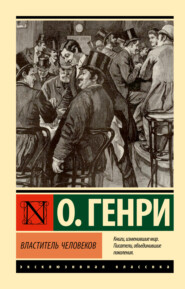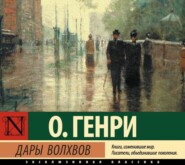По всем вопросам обращайтесь на: info@litportal.ru
(©) 2003-2025.
✖
Heart of the West [Annotated]
Настройки чтения
Размер шрифта
Высота строк
Поля
Vaminos shall have a word – Vaminos the good dun horse. The Mexicans, who have a hundred names for the colours of a horse, called him gruyo. He was a mouse-coloured, slate-coloured, flea-bitten roan-dun, if you can conceive it. Down his back from his mane to his tail went a line of black. He would live forever; and surveyors have not laid off as many miles in the world as he could travel in a day.
Eight miles east of the Cibolo ranch-house Ranse loosened the pressure of his knees, and Vaminos stopped under a big ratama tree. The yellow ratama blossoms showered fragrance that would have undone the roses of France. The moon made the earth a great concave bowl with a crystal sky for a lid. In a glade five jack-rabbits leaped and played together like kittens. Eight miles farther east shone a faint star that appeared to have dropped below the horizon. Night riders, who often steered their course by it, knew it to be the light in the Rancho de los Olmos.
In ten minutes Yenna Curtis galloped to the tree on her sorrel pony Dancer. The two leaned and clasped hands heartily.
"I ought to have ridden nearer your home," said Ranse. "But you never will let me."
Yenna laughed. And in the soft light you could see her strong white teeth and fearless eyes. No sentimentality there, in spite of the moonlight, the odour of the ratamas, and the admirable figure of Ranse Truesdell, the lover. But she was there, eight miles from her home, to meet him.
"How often have I told you, Ranse," she said, "that I am your half-way girl? Always half-way."
"Well?" said Ranse, with a question in his tones.
"I did," said Yenna, with almost a sigh. "I told him after dinner when I thought he would be in a good humour. Did you ever wake up a lion, Ranse, with the mistaken idea that he would be a kitten? He almost tore the ranch to pieces. It's all up. I love my daddy, Ranse, and I'm afraid – I'm afraid of him too. He ordered me to promise that I'd never marry a Truesdell. I promised. That's all. What luck did you have?"
"The same," said Ranse, slowly. "I promised him that his son would never marry a Curtis. Somehow I couldn't go against him. He's mighty old. I'm sorry, Yenna."
The girl leaned in her saddle and laid one hand on Ranse's, on the horn of his saddle.
"I never thought I'd like you better for giving me up," she said ardently, "but I do. I must ride back now, Ranse. I slipped out of the house and saddled Dancer myself. Good-night, neighbour."
"Good-night," said Ranse. "Ride carefully over them badger holes."
They wheeled and rode away in opposite directions. Yenna turned in her saddle and called clearly:
"Don't forget I'm your half-way girl, Ranse."
"Damn all family feuds and inherited scraps," muttered Ranse vindictively to the breeze as he rode back to the Cibolo.
Ranse turned his horse into the small pasture and went to his own room. He opened the lowest drawer of an old bureau to get out the packet of letters that Yenna had written him one summer when she had gone to Mississippi for a visit. The drawer stuck, and he yanked at it savagely – as a man will. It came out of the bureau, and bruised both his shins – as a drawer will. An old, folded yellow letter without an envelope fell from somewhere – probably from where it had lodged in one of the upper drawers. Ranse took it to the lamp and read it curiously.
Then he took his hat and walked to one of the Mexican jacals.
"Tia Juana," he said, "I would like to talk with you a while."
An old, old Mexican woman, white-haired and wonderfully wrinkled, rose from a stool.
"Sit down," said Ranse, removing his hat and taking the one chair in the jacal. "Who am I, Tia Juana?" he asked, speaking Spanish.
"Don Ransom, our good friend and employer. Why do you ask?" answered the old woman wonderingly.
"Tia Juana, who am I?" he repeated, with his stern eyes looking into hers.
A frightened look came in the old woman's face. She fumbled with her black shawl.
"Who am I, Tia Juana?" said Ranse once more.
"Thirty-two years I have lived on the Rancho Cibolo," said Tia Juana. "I thought to be buried under the coma mott beyond the garden before these things should be known. Close the door, Don Ransom, and I will speak. I see in your face that you know."
An hour Ranse spent behind Tia Juana's closed door. As he was on his way back to the house Curly called to him from the wagon-shed.
The tramp sat on his cot, swinging his feet and smoking.
"Say, sport," he grumbled. "This is no way to treat a man after kidnappin' him. I went up to the store and borrowed a razor from that fresh guy and had a shave. But that ain't all a man needs. Say – can't you loosen up for about three fingers more of that booze? I never asked you to bring me to your d–d farm."
"Stand up out here in the light," said Ranse, looking at him closely.
Curly got up sullenly and took a step or two.
His face, now shaven smooth, seemed transformed. His hair had been combed, and it fell back from the right side of his forehead with a peculiar wave. The moonlight charitably softened the ravages of drink; and his aquiline, well-shaped nose and small, square cleft chin almost gave distinction to his looks.
Ranse sat on the foot of the cot and looked at him curiously.
"Where did you come from – have you got any home or folks anywhere?"
"Me? Why, I'm a dook," said Curly. "I'm Sir Reginald – oh, cheese it. No; I don't know anything about my ancestors. I've been a tramp ever since I can remember. Say, old pal, are you going to set 'em up again to-night or not?"
"You answer my questions and maybe I will. How did you come to be a tramp?"
"Me?" answered Curly. "Why, I adopted that profession when I was an infant. Case of had to. First thing I can remember, I belonged to a big, lazy hobo called Beefsteak Charley. He sent me around to houses to beg. I wasn't hardly big enough to reach the latch of a gate."
"Did he ever tell you how he got you?" asked Ranse.
"Once when he was sober he said he bought me for an old six-shooter and six bits from a band of drunken Mexican sheep-shearers. But what's the diff? That's all I know."
"All right," said Ranse. "I reckon you're a maverick for certain. I'm going to put the Rancho Cibolo brand on you. I'll start you to work in one of the camps to-morrow."
"Work!" sniffed Curly, disdainfully. "What do you take me for? Do you think I'd chase cows, and hop-skip-and-jump around after crazy sheep like that pink and yellow guy at the store says these Reubs do? Forget it."
"Oh, you'll like it when you get used to it," said Ranse. "Yes, I'll send you up one more drink by Pedro. I think you'll make a first-class cowpuncher before I get through with you."
"Me?" said Curly. "I pity the cows you set me to chaperon. They can go chase themselves. Don't forget my nightcap, please, boss."
Ranse paid a visit to the store before going to the house. Sam Revell was taking off his tan shoes regretfully and preparing for bed.
"Any of the boys from the San Gabriel camp riding in early in the morning?" asked Ranse.
"Long Collins," said Sam briefly. "For the mail."
"Tell him," said Ranse, "to take that tramp out to camp with him and keep him till I get there."
Curly was sitting on his blankets in the San Gabriel camp cursing talentedly when Ranse Truesdell rode up and dismounted on the next afternoon. The cowpunchers were ignoring the stray. He was grimy with dust and black dirt. His clothes were making their last stand in favour of the conventions.
Ranse went up to Buck Rabb, the camp boss, and spoke briefly.
"He's a plumb buzzard," said Buck. "He won't work, and he's the low-downest passel of inhumanity I ever see. I didn't know what you wanted done with him, Ranse, so I just let him set. That seems to suit him. He's been condemned to death by the boys a dozen times, but I told 'em maybe you was savin' him for torture."
Ranse took off his coat.

















